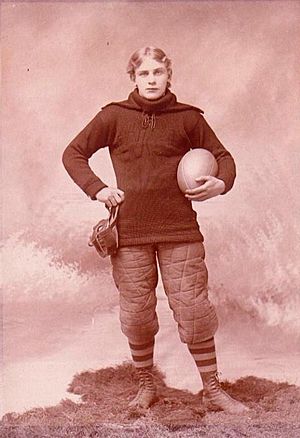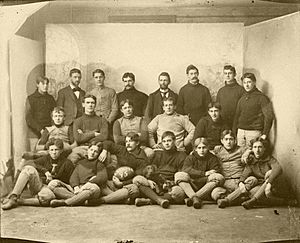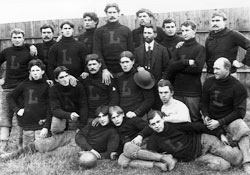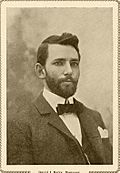Latrobe Athletic Association facts for kids
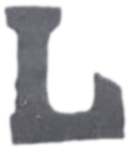 |
|
| Founded | 1895 |
|---|---|
| Folded | 1909 |
| Based in | Latrobe, Pennsylvania, United States |
| League | Western Pennsylvania Circuit |
| Team history | Latrobe Athletic Association (1895–1907) |
| Team colors | Orange, maroon (1895) Red, blue (1897–1900) Red, green (1903–1907) |
| Nickname(s) | "Latrobers" |
| Head coaches | Russell Aukerman (1895) John Brallier (1896) Walter Okeson (1897) Alfred E. Bull (1898) Russell Knight (1900) John Brallier (1902–1907) |
| General managers | David J. Berry (1895–1900) John Brallier (1903–1907) |
| Owner(s) | Latrobe YMCA |
| W. Pennsylvania Championship wins | (3) 1903, 1904, 1905 |
| Undefeated seasons | (5) 1899, 1902, 1903, 1904, 1905 |
| Home field(s) | Latrobe YMCA |
The Latrobe Athletic Association was an early professional football team. It was based in Latrobe, Pennsylvania, from 1895 to 1909. This team was part of the unofficial Western Pennsylvania Professional Football Circuit.
Latrobe is famous for two big reasons. First, it was the first football team to play a whole season with only professional players. Second, in 1895, Latrobe's quarterback, John Brallier, became the first football player to openly say he was paid. He got $10 plus travel costs to play for Latrobe against the Jeannette Athletic Club.
Contents
How the Team Started
In 1895, the local Latrobe YMCA decided to create a football team. They planned a full schedule of games. Russell Aukerman, a former college player and instructor at the YMCA, became the team's player-coach. This meant he played and coached at the same time.
David Berry, who ran a local newspaper, became the team's manager. Harry Ryan, a former college player, was chosen as the team captain. The team started practicing in early August. Many players had other jobs, so they practiced in the evenings if they couldn't make afternoon sessions. Practices were held on an empty lot owned by the Pennsylvania Railroad. Street lights helped light up the field at night.
First Player to Be Paid Openly
Just before the season began, Latrobe's quarterback, Eddie Blair, had a problem. He also played baseball in nearby Greensburg. His first football game clashed with a baseball game. Manager Dave Berry needed to find a replacement quickly.
Berry heard about John Brallier, a quarterback from Indiana Normal. He offered Brallier money for his travel to play for Latrobe. Brallier was unsure because he was going to play for Washington & Jefferson College soon. So, Berry offered Brallier $10 to play against Jeannette, plus travel costs. He also promised more games in the future. Brallier agreed. He became the first player to openly admit he was paid to play football. Brallier arrived the night before the game and practiced with the team.
For many years, John Brallier was seen as the first professional football player. However, after he passed away in 1960, it was found that he was just the first to openly admit being paid. William "Pudge" Heffelfinger of the Allegheny Athletic Association is now known as the very first professional player.
Early Years of the Team
1895 Season Highlights
Latrobe's first game of the 1895 season was on September 3, 1895. Before the game, there was a parade on Ligonier Street. A band led the parade, followed by both the Latrobe and Jeannette teams in their uniforms. Latrobe's team colors, orange and maroon, were seen everywhere. Stores closed, and local mines and factories gave workers a half-holiday.
The game started at 4:00 pm. Latrobe won against Jeannette. Latrobe's coach, Russell Auckerman, scored two touchdowns. Each touchdown was worth four points back then. Brallier kicked two extra points, which were worth two points each. The final score was 12–0.
After this game, Brallier played one more game for Latrobe. Then he went to Washington & Jefferson for college. Latrobe lost that second game to a team from Altoona, Pennsylvania, 7–0. The 1895 Latrobe YMCA team played 11 games in total. They won 7 games and lost 4. They lost twice to their rivals, the Greensburg Athletic Association.
1896 Season
Latrobe had a team for a second season in 1896. Many players from the year before returned. John Brallier came back as the team's quarterback and coach. The team started strong with wins against the Pittsburgh Imperials, the Jeannette Indians, Altoona, and Western University of Pennsylvania. Western University of Pennsylvania later became the University of Pittsburgh.
Latrobe then lost to the Greensburg Athletic Association, 10–4. They split two games against West Virginia University. They also won against Indiana Normal. But they lost again to Greensburg, 10–0. The team finished the season with 7 wins and 3 losses.
First All-Professional Team (1897)
The 1897 Latrobe team made history. It was the first football team made up entirely of professional players. Manager Dave Berry signed many college players from across the country. Walter Okeson, a former All-American player from Lehigh University, became the team's coach. George Shelafo from the Carlisle Indian School also joined Latrobe.
The team started the season with 7 wins and 1 tie. They beat teams like Jeannette, Pittsburgh Emeralds, and Western University of Pennsylvania. Later, Doggie Trenchard and Eddie Blair (the original quarterback) joined the team. Latrobe was undefeated until they lost to the Duquesne Country and Athletic Club 12–6. However, they bounced back with wins against the Pittsburgh Athletic Club and Youngstown.
Many thought the championship of western Pennsylvania would be between Duquesne and Pittsburgh Athletic Club. But Greensburg and Youngstown both beat Duquesne. This led to talk of a championship game between Greensburg and Latrobe. On November 20, 1897, Latrobe beat Greensburg 12–6 in a tough game. Locals called it "one of the greatest games ever played." After a loss to West Virginia, Latrobe lost their final game to Greensburg, 6–0. Still, a football expert picked three Latrobe players for an all-western Pennsylvania team: Walter Okeson, Harry Ryan, and Ed Abbaticchio.
All-Star Team and Quiet Years (1898–1902)
The Latrobe team stayed strong for the next few seasons. But they didn't win the western Pennsylvania championship. The 1898 team started with 7 wins in a row. Then they lost three games to Pittsburgh Athletic Club, Duquesne Country and Athletic Club, and Greensburg. They finished the season with 7 wins and 3 losses.
After the 1898 season, Latrobe manager Dave Berry created the first all-star team in professional football history. This team had players from several local teams. They played against the Duquesne Country and Athletic Club, which had many famous players. Duquesne won the game 16–0. This is seen as the very first all-star game in professional football. The game was held in Allegheny, Pennsylvania, which became part of Pittsburgh, Pennsylvania in 1907.
The next season was Latrobe's first undefeated season, even though they only played four games. The 1898, 1899, and 1900 seasons featured a colorful player named Charles Barney. Off the field, Barney was known for lifting and holding a piano while someone played it. The 1901 Latrobe season was quieter. The team played only three games, winning two and losing one. They lost to a team from nearby Derry.
Looking Forward to "Next Year"
John Brallier returned as player-coach for the 1902 season. Latrobe played only four games that fall. They had two ties and two wins. They beat the Indiana First Regiment team 22–2. In their last game, Latrobe defeated the Latrobe Steel Works 17–0.
At the end of the season, many fans and players felt hopeful. Most of Brallier’s players were young, around 17–18 years old. They wanted to learn and practiced hard. Brallier felt that people in Latrobe were saying, "wait until next year." He was right.
Undefeated Seasons
1903 Season
In 1903, the Latrobe YMCA organized a football team again. Many players from the 1902 team joined. John Brallier was again the player-coach. A fence was built around the Latrobe Steel Athletic Grounds. New uniforms were bought with money from local businesses. Some former players from the 1890s also rejoined the team.
Latrobe became the champion of western Pennsylvania that year with an undefeated season. The Franklin Athletic Club was seen as the "U.S. Pro Champion" but refused to play Latrobe. It's interesting that the 1903 Latrobe team was made up entirely of amateur players. This was different from their 1897 team, which was all-professional. Brallier said in 1934 that the 1903 Latrobe backfield was the best he had ever played with. Despite their winning season, the team was losing money because not many people came to the games.
1904 Season
At a team meeting on June 4, 1904, Brallier was again chosen as coach and manager. Harry Ryan was elected team captain. The 1904 season was another undefeated year for Latrobe. To save money, the team reportedly used only nine footballs all season. After paying all costs, the 16 players shared about $500 in profits. They also had a big chicken and waffle dinner to celebrate.
Sadly, a tragedy happened after the season. Paul Blair, a Latrobe player and Eddie Blair's brother, was killed by a train. Latrobe players Harry Ryan and John Brallier were pallbearers at his funeral. The team sent a beautiful floral wreath with the words "Latrobe Football Team, 1904."
1905 Season
By 1905, Latrobe had not lost a game in three years. The 1905 season brought a lot of hope to Latrobe. Several new college players joined the team. The team and community helped these players find jobs. It was hard to schedule games because many teams refused to play Latrobe. Others asked for too much money. Still, the team managed to get an 8–0 record without letting opponents score any points.
During this season, Latrobe played a big game against the Canton Bulldogs. The Bulldogs were a famous professional team from the unofficial "Ohio League." They later became a founding member of the National Football League. Canton was a very strong team, often scoring over 100 points in games. The game between Latrobe and Canton was on November 18, 1905, in Latrobe. Even with some injured players, Latrobe defeated the Bulldogs 6–0. A game against Canton's rivals, the Massillon Tigers, was suggested but never happened.
On December 2, 1905, the Latrobe Bulletin newspaper wrote a full page about Latrobe's three-year record: 26 wins, 0 losses, and a huge point difference of 794 to 5. The Pittsburgh Chronicle Telegraph also named five Latrobe players to its all-star team. There were plans for a Football Association with teams from Pennsylvania and Ohio. The idea was to have state champions play each other on Thanksgiving Day. But this plan never happened.
Decline of the Team
1906 Season
The 1906 season marked the start of professional football's decline in Latrobe. Many players still wanted to play for Latrobe. They stayed in the community, working in factories, mines, and stores. The team's success from 1903 to 1905 brought interest from players nationwide. However, efforts to raise money to pay players failed.
On November 29, 1906, Latrobe lost for the first time in four years. Canton beat them 16–0. Latrobe was supposed to get $1,500 for the game. $1,200 was for players' salaries, and $300 for expenses. But Canton's manager, Blondy Wallace, couldn't pay. This was due to a famous betting scandal between Massillon and Canton. Canton's fans were upset, which made things worse. Canton players also didn't get paid. To help Latrobe pay its expenses, the community raised some money. The YMCA borrowed the rest to cover the $300 debt.
1907 Season
By October 1907, people in Latrobe wanted the football team to be made up of local men. They didn't want to hire players from out of town anymore. Despite this change, the 1907 season was still pretty good. The team had 5 wins, 2 losses, and 2 ties. Harry Ryan had retired. John Brallier mainly served as a coach. Leo Gibson was chosen as Latrobe's captain.
California YMCA Game
During the 1907 season, the California (Pennsylvania) YMCA team came to Latrobe for a game. They were kicked out of their hotel rooms for bad behavior. They were accused of "chasing and frightening a chambermaid," jumping on and breaking beds, and using bad language. Latrobe went on to win the game 38–0 in front of a small crowd. It was said that this "YMCA" team was not actually connected to the Young Men's Christian Association.
1908 and 1909 Seasons
Community interest in the team decreased. The team changed from professional to a local amateur group. This happened around the time John Brallier stopped playing, though he kept helping coach local teams. Some players continued with the amateur teams in 1908 and 1909, led by Peck Lawson. However, the out-of-town players and the old rivalries mostly disappeared.
Team Legacy
Many important members of the early Latrobe professional football teams lived in Latrobe for many years. These included Brallier, Ryan, Abbaticchio, and Peck Lawson. Ed Abbaticchio also played baseball in the National League for teams like the Philadelphia Phillies and Pittsburgh Pirates. He was part of the Pirates' 1909 World Series team. John Brallier became a dentist in Latrobe. Others had local jobs. Brallier also served as a school director for 20 years. In 1979, the Professional Football Researchers Association voted John Brallier as one of the "Best Pros Not in the Hall of Fame."
After World War II, people wanted a football hall of fame like baseball's. At that time, the National Football League (NFL) recognized Latrobe as the birthplace of professional football. John Brallier was given a lifetime pass to NFL games. The Hall of Fame was eventually built in Canton, Ohio. But Latrobe's importance was honored when the Pittsburgh Steelers and Green Bay Packers played an exhibition game there on August 29, 1952. This event also honored the early professional players who were still alive.
Today, Latrobe is home to the Pittsburgh Steelers' training camp. It is located at Saint Vincent College.
Team Colors
Latrobe's first team colors were maroon and orange. But these colors changed "several times during the next decade," according to researcher Robert B. Van Atta. The team wore red and blue in 1897, 1898, and 1900. From 1903 to 1907, their colors were red and green.
 | William L. Dawson |
 | W. E. B. Du Bois |
 | Harry Belafonte |


